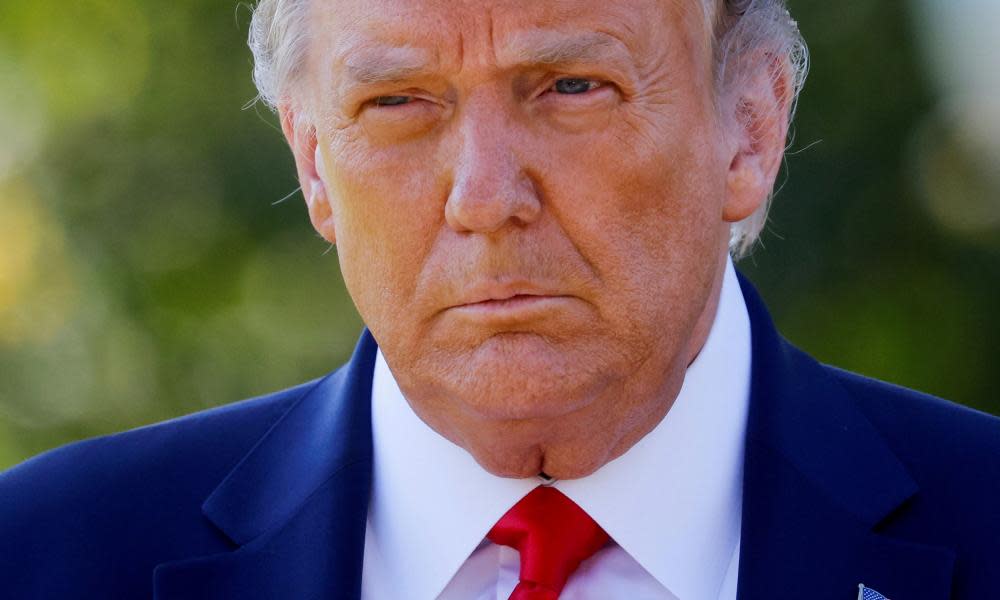Does Trump’s endorsement really carry the day in local elections?

As the Republican party first began to prepare for the 2022 midterm elections it seemed like Donald Trump had it all figured out.
The former US president had an axe to grind with certain Republicans who had bucked him in the past and the upcoming party primaries were a place he could assert his still powerful influence and exact revenge on his perceived foes.
The way it was supposed to go, Trump would remind voters of his airtight grip on the Republican party by endorsing his favored candidates and attacking his opponents. That would refill party ranks with loyalists and allies and in the process oust some of the biggest thorns in his side.
Fast forward through months of fundraising, a few special elections and a handful of candidate announcements and things aren’t quite going according to plan.
In Alaska, for example, Senator Lisa Murkowski, the incumbent Republican and a frequent Trump critic, does indeed have a Republican primary challenger – who has been endorsed by the Alaska Republican party – but the challenger has so far been dramatically out-fundraised by the senator.
In Texas, Trump weighed in on a Republican runoff for the state’s sixth congressional district only to see the Republican he didn’t endorse win. In Alabama, Congressman Mo Brooks, who has been endorsed by Trump in a multi-candidate primary, saw an increase in the number of donations he received this past quarter. But that increase didn’t mean Brooks got more money. Before Trump’s endorsement Brooks raised $168,000. After the endorsement Brooks raised about $100,000, according to Roll Call.
If the plan was for the next two years to be Trump’s empire strikes back, it’s been more like Trump’s empire doesn’t quite strike back.
That’s not to say Trump’s endorsement is meaningless in Republican politics now. Or that all the candidates he’s backing have lost. In Ohio, coal lobbyist Mike Carey, who had been endorsed by Trump, won a Republican primary for Ohio’s 15th congressional district, beating out an opponent supported by Senator Rand Paul. Trump, in the primary’s aftermath, opted to call attention to that.
“Do you think Rand Paul will apologise for spending nearly $1m on another candidate in Ohio’s 15th district congressional race after I had already endorsed Mike Carey?” Trump said in a statement.
He added pointedly: “Do you think he learned his lesson?”
Trump is also taking care to try to boost candidates most capable of defeating his arch-nemesis. In the race for Wyoming congresswoman Liz Cheney’s congressional seat, Trump was set to meet with a potential challenger, according to Politico. The former president has repeatedly urged Republicans to rally around just one challenger and for the primary field to shrink to maximize the chance that Cheney – probably the most prominent Trump critic in the party - loses reelection.
Nevertheless, it’s clear that Trump’s endorsement does not decide the outcome of a Republican primary anymore.
Similarly Trump has tried to demonstrate his control of the Republican party by urging lawmakers on Capitol Hill to oppose the Biden administration’s infrastructure bill – but not with any decisive success. In the end 19 Republican senators, including the Republican leader in the chamber, joined with Democrats to advance the bill.
Senator Mitch McConnell of Kentucky, the Republican leader, also said in an interview with the Wall Street Journal that Biden “deserves a lot of credit for getting the Democrats open to reaching a bipartisan agreement on this bill” – a sign that one of the most powerful Republicans in the country isn’t afraid of ignoring Trump’s urgent pleas.
Sarah Longwell, a Republican strategist and publisher of the right-leaning Bulwark website, cautioned that this doesn’t mean Trump’s endorsement is meaningless.
“His endorsement is still worth something toward a certain percentage of the party,” Longwell said. “However I don’t think his endorsement is as important or doesn’t have as much impact as when he attacks you. But that doesn’t work everywhere.”
Still, there are plenty of Republicans who are, at the very least, hesitant to weigh in on Trump’s power, somewhat because of the prospect of incurring his wrath, and somewhat just to avoid alienating the slice of Republican voters who still listen to him. In short, Trump’s backing is important but – especially in complex local races – it is not the be-all and end-all.
Longwell added: “To the extent that Trump continues to support some of the extreme candidates, his support alone cannot get over the finish line.”

